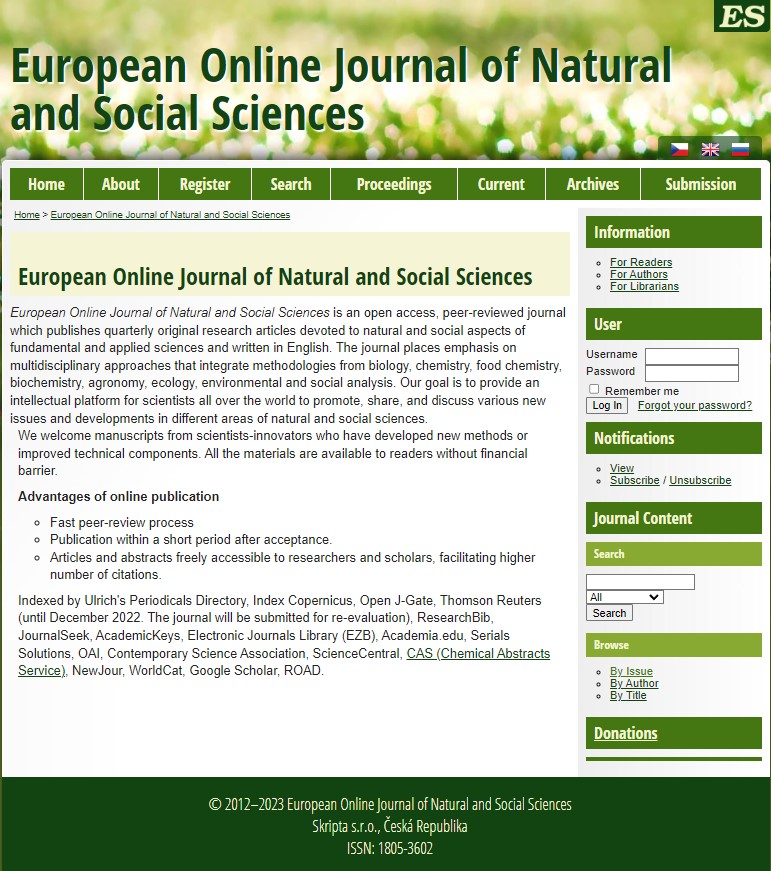 Dr. Victor V. Hafalla Jr., REE
Dr. Victor V. Hafalla Jr., REE
Faculty, School of Engineering and ArchitectureEuropean
University of Baguio, Baguio City, Philippines
Online Journal of Natural and Social Sciences 2022
Vol.11, No 4 (s) Special Issue on Hybridity in the New Reality, 250-256 (2022)
Abstract
 Teachers’ technological knowledge and teaching pedagogies are continually challenged by the shift towards online learning. Recognizing this phenomenon, the study aimed to derive a model incorporating the teachers’ TPACK (technological pedagogical and content knowledge), constructivist teaching practices (CTP), technological self-efficacy (TSE), teaching experience, frequency of educational-technology trainings attended, and type of subjects taught using structural equation modeling techniques. The study comprised 187 teachers from 16 teacher education institutions. Results indicated that the teachers’ CTP loaded highly on their pedagogical knowledge (PK) while their TSE also loaded highly on their technological knowledge (TK). The respondents’ years of teaching experience indicated a significant but negative loading on the teachers’ TSE. In contrast, the type of subjects taught by the teachers was removed from the model due to non-significance. The number of trainings attended by the teachers did not significantly predict their TSE as well as the teachers’ TPACK. Fit indexes indicated that the proposed model is marginally acceptable. Further scrutiny of the derived model implied that the hypothesis that all elementary constructs of TPACK directly predicting the teachers’ TPACK is rejected, validating results from previous studies. The analysis of the different structural paths also suggested that CTP greatly influenced the teachers’ TPACK due to the combined effects of its direct and indirect paths, indicating that TPACK is much rooted in the constructivist philosophy. However, the teachers’ TPACK was mostly positively predicted by PCK (pedagogical content knowledge), CTP, and TPK (technological-pedagogical knowledge). Results of the derived model, however, challenged the veracity of the TPACK construct.
Teachers’ technological knowledge and teaching pedagogies are continually challenged by the shift towards online learning. Recognizing this phenomenon, the study aimed to derive a model incorporating the teachers’ TPACK (technological pedagogical and content knowledge), constructivist teaching practices (CTP), technological self-efficacy (TSE), teaching experience, frequency of educational-technology trainings attended, and type of subjects taught using structural equation modeling techniques. The study comprised 187 teachers from 16 teacher education institutions. Results indicated that the teachers’ CTP loaded highly on their pedagogical knowledge (PK) while their TSE also loaded highly on their technological knowledge (TK). The respondents’ years of teaching experience indicated a significant but negative loading on the teachers’ TSE. In contrast, the type of subjects taught by the teachers was removed from the model due to non-significance. The number of trainings attended by the teachers did not significantly predict their TSE as well as the teachers’ TPACK. Fit indexes indicated that the proposed model is marginally acceptable. Further scrutiny of the derived model implied that the hypothesis that all elementary constructs of TPACK directly predicting the teachers’ TPACK is rejected, validating results from previous studies. The analysis of the different structural paths also suggested that CTP greatly influenced the teachers’ TPACK due to the combined effects of its direct and indirect paths, indicating that TPACK is much rooted in the constructivist philosophy. However, the teachers’ TPACK was mostly positively predicted by PCK (pedagogical content knowledge), CTP, and TPK (technological-pedagogical knowledge). Results of the derived model, however, challenged the veracity of the TPACK construct.
